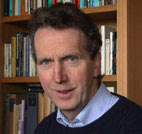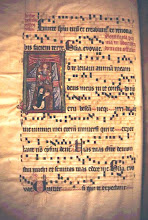Christine Clear, who led week 4 - To Travel in Hope, writes; The last night of our course took place as a 'contemplative conversation', that is, a format which allows for reading, reflection, examination,sharing and prayer. The conversation centered around Luke's chapter 24, which contains the well-known story known as the Road to Emmaus. The title of the evening was "To Travel in Hope", and the conversation focused on how hope and despair can be carried with fortitude. Expressions of negative media attention on the Church and Catholicism in particular and the hurt caused thereby, drew a range of testimonies on how negative pressures can often emerge when following a spiritual path.
Using the theologies of Easter to give a context for what is happening in the Church and Irish society today, it was presented that we need a theology for Saturday. Whilst we have a theology for Friday's death and despair, and Sunday's glory and resurrection, a theology of change, of waiting, of transition, was needed. It was suggested however, that in Ireland today we might still be experiencing the death of a form of Catholic belief. How one might deal with hurt, despair, depression were examined and suggested as the moments when one can ask Christ for help and can live under his loving protection.
The conversation turned to how one can recognize flagging spiritual strength, and the counter ways one can combat emotional and spiritual depletion. Throughout the conversation the spirit and soul were seen as being integral parts of the human person and awareness of remaining connected, was offered as a necessary sensitivity for spiritual renewal.
Sunday, March 14, 2010
Sunday, March 7, 2010
WEEK 3: Fr. John Littleton on Catholicism and its Personal Appropriation
What being Catholic means to me
A. CATHOLIC IDENTITY
Catholic identity can best be defined using three terms:
• Universality (or catholicity),
• Tradition, and
• Sacramentality.
These three principles describe the overlapping and interdependent, yet distinctive, strands of Catholicism.
1a. Universality/Catholicity
By universality (or catholicity) is meant the undivided, worldwide ecclesial community that gathers people of different nationalities, cultures and languages into one People of God.
• World-wide ecclesial community
• All-inclusive
• Missionary by nature
• Church of Christ ‘subsists’ in Catholic Church
1b. Tradition
Tradition refers to the process of passing on the lived heritage of God’s self-revelation that culminated in Jesus of Nazareth and which concluded at the end of the apostolic era.
• Handing-on of faith
• Continuity
• Faith is caught, not taught
• Scripture and Tradition
1c. Sacramentality
The principle of sacramentality deals with human beings coming into God’s presence. We do this through signs and symbols, words and gestures that provide us with access to the Mystery of God. e do not simply leap into God’s presence. It takes much time and sustained effort and we do so using material reality (what is visible and tangible) to communicate with spiritual reality (what is invisible and intangible).
• All of life is sacramental; existence is graced
• We are a sacramental people
• 7 sacraments: bring about what they signify
• Church is the sacrament of salvation
1d. Important to remember
The Church is semper reformanda (always in need of renewal) and not Societas perfecta (the perfect society).
1e. Daniel Donovan’s 6 characteristics
1. Stress on community
2. Taking history seriously
3. Insistence on faith as acceptance of revelation as well as commitment
4. Sacramentality
5. Ordering of the community; ordained ministry
6. Tension between unity and diversity
B. BASIC CATHOLIC BELIEFS
• The centrality of Jesus Christ and the authority of the Bible
• The Mass (Eucharist)
• The other sacraments
• The Papacy
• The Magisterium
• The dignity of all life
• The role of the Blessed Virgin Mary and the other saints
• Ecumenical in spirit
C. CATHOLIC IDENTITY AND DISSENT
• Catholics are obligated to adhere only to what the Catholic Church has committed itself definitively.
• Catholics use the ‘hierarchy of truths’ principle that interprets the truths of faith by their relative importance in the context of the central mysteries of Catholic faith.
• The sensus fidelium (the sense of the faithful) is exercised by all members of the Church who, inspired by the Holy Spirit, collectively contribute to the resolution of faith-related questions and ethical dilemmas.
• Catholics must act in accordance with an informed conscience so that they can make enlightened decisions.
D. SOME CONCERNS
• The disappearance of Catholic culture
• The demise of sacramental confession
• The (perceived) crisis in vocations to the priesthood and the religious life
• The lack of effective Church leadership
What does it mean to be a Catholic today? First, what it does not mean. It surely does not mean having such a rigid sense of identity that there is no room any longer for diversity and for outreach to those with different points of view, both within and outside the Church. Nor does it mean having such a soft sense of identity that there is no longer any theological, spiritual, or doctrinal core. It is one thing to say…that there is a hierarchy of truths, such that distinctions have to be made always between the essential and the non-essential, or between the important and less important. But it is quite another matter to imply that there are no truths at all, no defining characteristics of Catholic identity, as if Catholicism is simply the sum total of its disparate parts or, worse, whatever one wishes to make of it. [Richard McBrien, ‘Before and After Vatican II’, Priests and People, 10(8, 9), 1996, p.301.]
A. CATHOLIC IDENTITY
Catholic identity can best be defined using three terms:
• Universality (or catholicity),
• Tradition, and
• Sacramentality.
These three principles describe the overlapping and interdependent, yet distinctive, strands of Catholicism.
1a. Universality/Catholicity
By universality (or catholicity) is meant the undivided, worldwide ecclesial community that gathers people of different nationalities, cultures and languages into one People of God.
• World-wide ecclesial community
• All-inclusive
• Missionary by nature
• Church of Christ ‘subsists’ in Catholic Church
1b. Tradition
Tradition refers to the process of passing on the lived heritage of God’s self-revelation that culminated in Jesus of Nazareth and which concluded at the end of the apostolic era.
• Handing-on of faith
• Continuity
• Faith is caught, not taught
• Scripture and Tradition
1c. Sacramentality
The principle of sacramentality deals with human beings coming into God’s presence. We do this through signs and symbols, words and gestures that provide us with access to the Mystery of God. e do not simply leap into God’s presence. It takes much time and sustained effort and we do so using material reality (what is visible and tangible) to communicate with spiritual reality (what is invisible and intangible).
• All of life is sacramental; existence is graced
• We are a sacramental people
• 7 sacraments: bring about what they signify
• Church is the sacrament of salvation
1d. Important to remember
The Church is semper reformanda (always in need of renewal) and not Societas perfecta (the perfect society).
1e. Daniel Donovan’s 6 characteristics
1. Stress on community
2. Taking history seriously
3. Insistence on faith as acceptance of revelation as well as commitment
4. Sacramentality
5. Ordering of the community; ordained ministry
6. Tension between unity and diversity
B. BASIC CATHOLIC BELIEFS
• The centrality of Jesus Christ and the authority of the Bible
• The Mass (Eucharist)
• The other sacraments
• The Papacy
• The Magisterium
• The dignity of all life
• The role of the Blessed Virgin Mary and the other saints
• Ecumenical in spirit
C. CATHOLIC IDENTITY AND DISSENT
• Catholics are obligated to adhere only to what the Catholic Church has committed itself definitively.
• Catholics use the ‘hierarchy of truths’ principle that interprets the truths of faith by their relative importance in the context of the central mysteries of Catholic faith.
• The sensus fidelium (the sense of the faithful) is exercised by all members of the Church who, inspired by the Holy Spirit, collectively contribute to the resolution of faith-related questions and ethical dilemmas.
• Catholics must act in accordance with an informed conscience so that they can make enlightened decisions.
D. SOME CONCERNS
• The disappearance of Catholic culture
• The demise of sacramental confession
• The (perceived) crisis in vocations to the priesthood and the religious life
• The lack of effective Church leadership
Subscribe to:
Posts (Atom)



